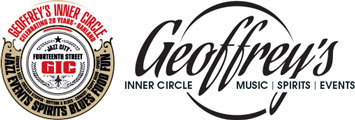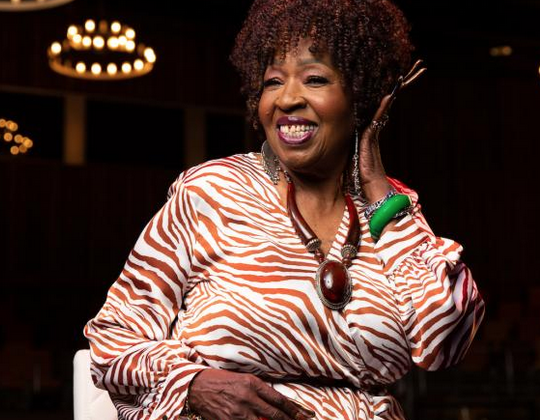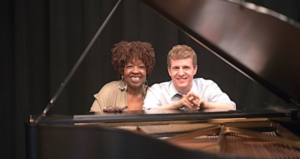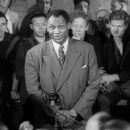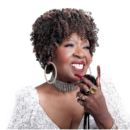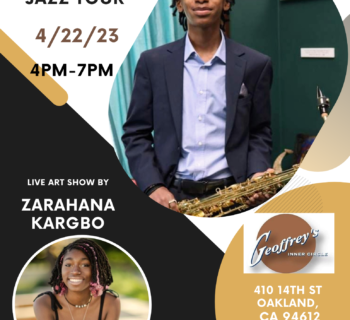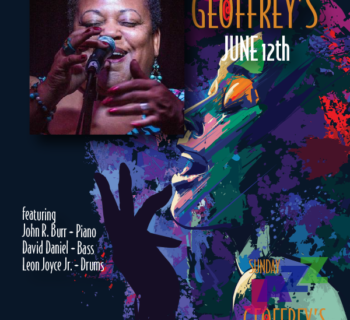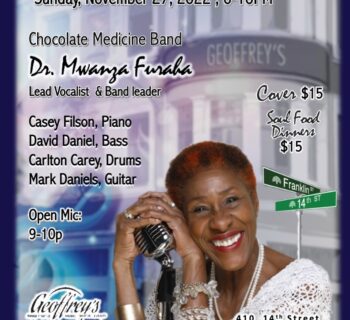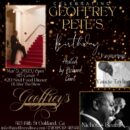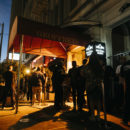Posted January 11, 2022 from San Francisco Classical Voice —
By Lou Fancher —
Having provided sublime and sizzling performances to audiences in the Bay Area and beyond for six decades, few would deny jazz vocalist The Dynamic Miss Faye Carol the marquis title by which she is best known. While championing the contributions of jazz musicians and composers both established and new — especially highlighting Black artists from the early 1900s to today — her distinct, powerful voice and warm stage presence have endeared her to fans of all ages. As founder of The School of the Getdown, multiple generations of students have reaped the benefits of what she tells me in a recent conversation is her primary principle and purpose as a singer and educator: “My biggest thing is, I don’t like to be polarized, compartmentalized with one music versus another music.”
Of course, with 60 years belting out or crooning everything from classic blues to jazz standards to gospel, R&B, funk, Latin jazz, pop, and hip-hop, a lot has been written about her. A recent announcement from the Hewlett Foundation places Carol among Bay Area artists awarded a Hewlett 50 Arts Commissions in Folk and Traditional Arts. As she embarks on a project funded by the grant that bears the intriguing title Blues, Baroque, and Bars: From the Streets to the Symphony, she tells me the new work is set to premiere in Oakland in 2022 before traveling to four underserved locations in the Bay Area.
While researching questions and topics, a thought occurs to me. Instead of tossing queries at her, I wish I could just throw a big old, blowout party and invite everyone to come and celebrate her work and the legendary impact she’s had on the local jazz scene. What would the playlist be? I decide to ask Carol to make a few selections and with that, our conversation is off and running.
Ok, let’s say I’m throwing a big bash for you, and you get to select the first five to six songs of the party playlist to get things rolling. What would you choose?
Oh my god, I’ve had tough questions before and that is a tough question. Oh my. This early in the day? I have to think a moment. I just love so much; this might be like leaving some of my babies off … Let’s see, I’d have to have a gospel song. That would be “Precious Lord.” I’d have to be swinging somewhere, which would be very hard to pick out one, because of all the swinging people I’d want to get to. I’ll come back to that. In the R&B world, that would be in Ray Charles territory. It would be “Bein’ Green,” one of my all-time favorite songs. Let me see … I’d have to have something funky in there: “September,” Earth, Wind and Fire.
Jazz, this is going to be hard because I’ve only got one more selection and I’ve gotta use all my babies; Nina Simone, Aretha Franklin, Sarah Vaughan, Dinah Washington, Judy Garland. A mashup medley? Yeah, that would be good if we had two or three. We’ve got “Cheek to Cheek,” “I’ve got you Under My Skin,” and let’s just say — I have to have blues in there — I’d have to have “Blueberry Hill.” This is like torture coming up with favorite songs when I just love so much and so many artists! There have been so many people who have so much to say. I believe in loving everybody that’s got something to say. By the time I found out jazz was my culture, I got triply interested. I started listening and getting educated and it’s so rich and so wonderful.
Tell me about enduring the pandemic shutdown and developing your livestream Chez Carol studio. Was that a special kind of torture too?
It was like the title of that song, “My 99th Nervous Breakdown.” [Carol may have meant “19th Nervous Breakdown,” written by Mick Jagger and Keith Richards in 1965.] I’m a people kind of girl and streaming is what it got down to be for a while. That was very difficult for me. It’s like I was in the cosmos someplace hoping it was reaching people. I would never know until I was finished, and then I’d see the comments. I’d see that people were listening and getting it. It was delayed reaction for me that I was really reaching people. Meanwhile it left me time to practice and thinking about the different projects I’m going to be having coming up.
What did the experience teach you about music and the value it brings?
I think I learned the way technology reaches people. It let me see how people really do connect with each other, because I’m not a big fan of technology. The importance of the music and my part in the music, I kind of already know that. Because hard times, I’ve had those before. When you have a long career, you have valleys and you have peaks. At the valley point, that’s when you find out, can you hang in there? You do whatever’s necessary to do to get to other side. Your love and discipline makes that happen and I become more reinforced. It’s difficult to do that in a space where there’s not a lot of room made for it in the overall culture. You make your own room and that has always been and continues to be a constant challenge. I tell my students you have the right to the tree of life in the morning, so you just wake up and go for what you want. If you are honest and really driven, something happens and you can do it. It’s magic. Music is the magic. The value of this jazz music was so established, long before I came along. I just want to do my part on the planet to keep it alive, uplifted, and have everybody know how valuable it is.
Was there ever a hard time when you thought about giving up?
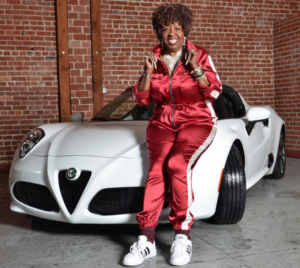 No I don’t get to that point. I just get to that frustrated point of which way do I go, how long do I wait, what other avenue do I take? This is what I’m supposed to be doing. But I will tell you that a time when it got hard was when I did R&B for eight to 10 years and had a high old time and it felt, at its peak, that it was going to go on forever. The music was good and plentiful and when disco came in, it knocked everything out of the hood for live bands. What am I going to do now? It took figuring it out, hanging in there, being despondent, not happy and letting things go, thinking “this can’t be the end of me. What am I going to do?” I practiced more, learned about the craft, hung in there until I could see another road to travel. It was difficult to go from working all the time to almost nothing. It was segregated at that time: there had been lots of work in the hood, then it went away. What to do now? You’re not singing top 40, your band is dissipating. That’s when, enter my own trio, figure out how to do that. What do you want when you say you want a trio? How do you run a trio when you’ve not had to?
No I don’t get to that point. I just get to that frustrated point of which way do I go, how long do I wait, what other avenue do I take? This is what I’m supposed to be doing. But I will tell you that a time when it got hard was when I did R&B for eight to 10 years and had a high old time and it felt, at its peak, that it was going to go on forever. The music was good and plentiful and when disco came in, it knocked everything out of the hood for live bands. What am I going to do now? It took figuring it out, hanging in there, being despondent, not happy and letting things go, thinking “this can’t be the end of me. What am I going to do?” I practiced more, learned about the craft, hung in there until I could see another road to travel. It was difficult to go from working all the time to almost nothing. It was segregated at that time: there had been lots of work in the hood, then it went away. What to do now? You’re not singing top 40, your band is dissipating. That’s when, enter my own trio, figure out how to do that. What do you want when you say you want a trio? How do you run a trio when you’ve not had to?
If you had received warning that your ability to even listen to music was going to vanish forever within 24 hours, what songs or musicians would you hope to hear on that last day?
Oh my goodness girlfriend, you come up with things I’ve never been asked before or even thought of. I love it. But I hope that vanishing never happens. How much time? Oh, 24 hours! That means I would never sleep. I’d put on Mahalia Jackson, Aretha Franklin, Nina Simone, Charles Brown, Louis Armstrong, Bessie Smith, Count Basie, Gene Ammons, John Coltrane, Dizzy Gillespie, Charlie Parker, Abbey Lincoln, James Brown, Otis Redding. I would just have a never-ending list. I’d just pack it in, turn it up loud and feel their vibe. Mm-hmmm.
Black women blues artists in the Bay Area, you’ve said, are so many times historically and even now “first in talent last in line.” Is that changing? Do you see new momentum?
That hasn’t changed. I don’t see the momentum. I live inside my own struggle of it so I don’t want to say there’s not momentum for somebody else because I sure hope there is. I recently got momentum and that felt good. But in general out there, it’s pretty rough for people. I’d hate to be starting out right now; there’s no ground to learn your craft. There are things taught in school or a formal college. There are certain things you can learn there but there are no jam sessions, no people you can talk to and be in real time with, no people who you can sit at their feet and learn while they’re doing their thing from watching them. The way the music used to be passed on, there are not a lot of avenues for that. There’s no gray matter: either you’re at the top or you’re at the bottom trying to stay alive. There’s no making a good living, doing your thing, with the perils of life going up and down but you have a good life and can make a good living and you don’t have to be a household name to do it. Now, it’s only some raised to the top and it’s hard to get with musicians cut from same cloth. Don’t get me wrong, I love talent as much as anyone. Talent will always come forth, but we don’t have the same life experiences to relate to the same things in music. It’s hard to get to that steady, lived experience. People can’t afford to just live it, live music, because the cost of living is so doggone high. You don’t have time to focus on your craft, because you have to pay the PG&E bill. It’s a juggling act and you either have to know how to do — teach, put it together — or somehow get some rocket to the top.
Tell me about the Hewlett award and the project you’ll be doing with Art + Soul Oakland: Blues, Baroque, and Bars: From the Streets to the Symphony, a work about Black Americans and their journey from Africa to the Great Migration.
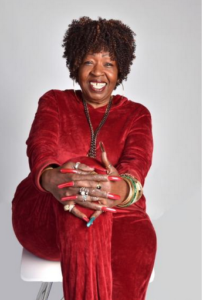 That’s the title of the piece, and what I’m really excited about and what is opening up because I was awarded the grant that I am so grateful for is that I am liberated by it. It will allow me the freedom to do a really nice, commissioned work. I’ll be headlining the Art + Soul Festival in July and I’ll be able to go around to four underserved communities and present this work for free: East Palo Alto, Pittsburg, Richmond, and Bayview. I’ll be free to enrich people with music.
That’s the title of the piece, and what I’m really excited about and what is opening up because I was awarded the grant that I am so grateful for is that I am liberated by it. It will allow me the freedom to do a really nice, commissioned work. I’ll be headlining the Art + Soul Festival in July and I’ll be able to go around to four underserved communities and present this work for free: East Palo Alto, Pittsburg, Richmond, and Bayview. I’ll be free to enrich people with music.
The piece is going to incorporate a string quartet and a rapper or MC. I’ll be able to have a wonderful work, hire first class musicians. It’s going to free me up to commission top notch musicians; people folks out here don’t get a chance to see or to see in our home community. To be able to expose people in a happy, good feeling, first class way with so many elements — you know, one of the things I fight is polarization. This camp, that camp, this genre, that genre; but to me, music is a broad paintbrush. It’s whatever you like. I’ll draw on my whole life and it will all be incorporated in this. Blues is the foundation of all American pop music, especially Black music. Baroque signifies the European craft of music that was already here and is from Europe, but we all use the same C chord. The “Bars” demonstrates where we are here, now, with hip-hop, just another name for something. It’s what we’re dancing to, so for me, it’s not over there, it’s all right here, just like all of us are right here. To bring this music to a broad community of all races and stripes of people and to be able to collaborate is a beautiful thing. I can bring it out to communities that are so starved out that amnesia is setting in. Especially for the young kids, I want them to know how valuable and vibrant music is, not just in history but now, in this time.
You have a program about Black history and Black music you brought during the pandemic to students in the Oakland Unified School District. What most surprised you about the students — one good surprise, one disappointing one?
I’ve been around students for a long time, ’cause I love them. They’re the future for every doggone thing. They are who they are in the time of life they are in. Most of those things in their lives, they inherited; they didn’t create these things. I ain’t mad at them about anything and they aren’t mad at me. It surprises other people how attentive they can be to something they don’t know or hear every day. Usually, people speak of this music as if it is antiquated. I bring life — what jazz is in me right now — and the love I have for them. It’s usually a pretty good outcome. People who don’t want to drive with it, I say that’s their prerogative. In time, maybe they’ll change. They’ll have time to evolve. If they don’t ever see it or hear it, you can’t blame them for any reaction they might have.
I have a good rapport with kids because I just like them and they like me back. I come at them in a live way. This is not something you have to sit down on your hands or sit back to listen to. You can be yourself. And I’m going to listen too, not demand anything other than ask them to listen. You can choose to get what I‘m trying to give you. I get comments that would be surprising to some people: they write back and you know they’re listening, getting it, getting comical or serious in their questions, so they’re engaged. Nothing says they have to be engaged; you just hope they would be. I’m coming on a little bitty screen into their homes in this program. So it was something, the comments from all different ages, how they would talk to each other, the slang words they use and I’d have to find out what this or that means. Somebody tell me! It keeps your mind open to learn how stuff is evolving.
You have a terrific partnership with (Martinez pianist) Joe Warner. How did that come about? Did you click immediately?
At first, I had said no I wasn’t going to hire him. I wanted somebody already ready, not someone getting ready. But he was just there all the time, seemed interested, and came when I needed somebody in an instant. He was there and I said, “Sit down.” We got through that set, I got to know him, I saw his work ethic. It impressed me so much. He did have and still has a great work ethic. That means everything. I’m not going to cajole you or babysit you. You have to work hard, and he worked hard, tirelessly, all the time. He had the same musical mind so we kind of clicked. He and I liked the same people. Over time, we just started to work out that he started learning my book. I watched him learn my book in way no one else ever had. He was dead serious, worked hard, would be there in real way — that’s him. He’s totally committed to the art form and growing for himself, and he supports me musically.
Is there a partnership that didn’t click smoothly or took a lot of work but paid off?
Oh yeah, just about everybody I’ve worked with I can say that about. If you come here, you’re going to get better just based on the material. It’s been around and proven; I just put my spin on it. Do I have to cajole you to practice, or will you do it on your own? In each person getting better we’ll become a tighter unit. There’ll be pressure there, but if you put work in, you get a result out. If you work in a joyful way, there will be joy. If you put work in like pulling teeth, you still get something out of it because right is right. But when you go willingly, it’s joyous, and even if you leave working with me eventually for another reason, you’ll grow.
After decades working in the Bay Area as a singer and plenty of profiles and reviews written about you, is there something you believe hasn’t been or can’t be written about enough?
All the writing that has been done about me, I never asked for it, so when people want to know things, I tell them. A lot of times when I need publicity, people tend to ask the same questions, except you today. My biggest thing is I don’t like to be polarized, compartmentalized with one music versus another music. I think it’s all one thing and you have different tastes. Because you like Mexican food, it doesn’t mean you don’t like Italian food. If you like Italian food, doesn’t mean you don’t like Soul food. That’s how I am about music. It’s meant for people to be together in harmonious ways. Black music and its contribution, I’d like it to be recognized. I hold up images of music I’ve loved and saw as great music. Lena Horne was great. B.B. King was great. That’s what I want to be. Hold that up for the culture to be recognized. And others who have loved and participated in the culture, I want for them to be recognized also. Know that it’s Black music first and then after that, it is all gravy. How can people not know about that and when they find it, not want to write about it?
Please tell me about the Faye & The Folks series of shows planned for February 2022.
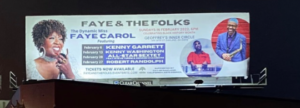 That’s one thing I’m up about. Ken Garrett, I’ve admired him for so long and I’m so grateful to say the City of Oakland supported this month of Black music and Black history. We’ll be in Geoffrey’s Inner Circle to present it as the only place in the Bay Area to see these wonderful artists. Joe and I are over the moon about it. There’s Kenny the first weekend and then Kenny Washington, and then the sextet [Dennis Chambers, drums; Steve Turre, trombone; Elena Pinderhughes, flute; Bill Orti, trumpet; Warner on piano, and Essiet Essiet, bass], I’m over the moon about that. The horns and their harmonies and all the moving parts — I can’t wait. And the last weekend is going to be Robert Randolph who I’ve loved for a long time. He’s unique with his steel guitar and his approach to music, He will be solo, and Joe and I will be doing a duo set, and then at the end of the night we’ll do some stuff together.
That’s one thing I’m up about. Ken Garrett, I’ve admired him for so long and I’m so grateful to say the City of Oakland supported this month of Black music and Black history. We’ll be in Geoffrey’s Inner Circle to present it as the only place in the Bay Area to see these wonderful artists. Joe and I are over the moon about it. There’s Kenny the first weekend and then Kenny Washington, and then the sextet [Dennis Chambers, drums; Steve Turre, trombone; Elena Pinderhughes, flute; Bill Orti, trumpet; Warner on piano, and Essiet Essiet, bass], I’m over the moon about that. The horns and their harmonies and all the moving parts — I can’t wait. And the last weekend is going to be Robert Randolph who I’ve loved for a long time. He’s unique with his steel guitar and his approach to music, He will be solo, and Joe and I will be doing a duo set, and then at the end of the night we’ll do some stuff together.
What artists are you listening to who give you hope about the future of jazz and the Blues and the kind of work you’ve devoted yourself to for six decades?
I like Jazzmeia Horn. I’ve heard her a few times and she seems to have that spark. She’s soulful, a woman coming along who sounds good, really swings. From R&B, I like Jazmine Sullivan. Like I mentioned before, talent will always come and we will always be drawn to talent. As long as this music I do evolves, even in ways I don’t know about yet, I’m sure it will still be around. Because at one time there was Dinah Washington and other folks who didn’t know I was there somewhere trying to do it, but I was and I am. Even if you don’t hear about them, somebody is somewhere trying to do it. Someone with something to say. And for young instrumentalists, I’m sure there are some of those around. No one is running around saying do it, do it, so this music is not being pushed on people. No one is showing them how to do it or the money to be made. The music just calls and it’s always calling. How did this young white boy like Joe from Martinez come to me knowing this music? He just did, so there’s always going to be somebody coming.
